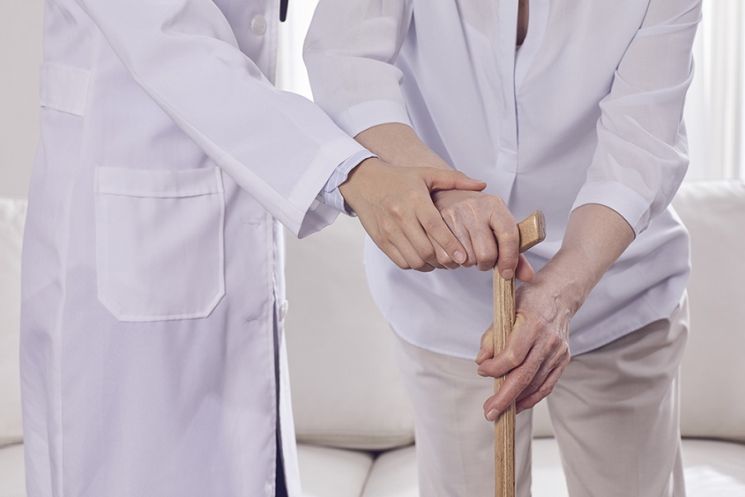Daedong Hospital Manager Shin Hye-gyeong “If neglected, it causes secondary disease, and you need to be treated with constant exercise and drugs”
![Every April 11th is'World Parkinson's Day'. [이미지출처=클립아트코리아]](https://i0.wp.com/cphoto.asiae.co.kr/listimglink/1/2021041115051974779_1618121119.jpg?w=560&ssl=1)
Every April 11th is’World Parkinson’s Day’. [이미지출처=클립아트코리아]
卝蹂몃nat湲 븘씠肄
[아시아경제 영남취재본부 김용우 기자] The illness suffered by Michael Jafox, the protagonist of the movie “Back To The Future,” and Ronald Reagan, the 40th president of the United States, and the legendary boxer Muhammad Ali.
In 1817, when the British doctor James Parkinson first reported to the academic world, the disease began to be called’Parkinson’.
Every year, April 11th was established to commemorate James Parkinson’s birthday as’World Parkinson’s Day’.
Parkinson’s disease, which is one of the world’s top three senile brain diseases along with dementia and stroke, increased 13.2% from 11,917 in 2016 to 12,5607 in 2019, based on the National Health Insurance Review and Assessment Service’s statistics on diseases of interest.
As of 2019, 49.5% in their 80s, 35.4% in their 70s, and 11.4% in their 60s were found to be more frequent among women (68%) than men (32%).
As neurons of dopamine, a neurotransmitter distributed in the black matter of the brain, die, movement disorders such as stiffness, tremors, slow behavior, posture instability, and balance disorders are typical symptoms.
It is a degenerative neurological disease in which non-motor symptoms such as cognitive impairment, vision, depression, and autonomic nervous system symptoms appear, and the initial symptoms are often expressed as pain or depression.
5-10% of patients are identified as genetic causes, but the exact cause has not been identified to date.
There is no special diagnosis method, so the most important thing in diagnosing Parkinson’s disease is the symptoms that appear in Parkinson’s patients.
The symptoms of tremors that are evident during rest and stiffness when moving the joints passively due to increased muscle tension, slow movements and decreased pronunciation, slow movements such as an expressionless face, and a posture in which the body is bent forward and hung up Instability is the main symptom of Parkinson’s disease.
People with Parkinson’s disease have short strides when walking and often fall with their body leaning forward.
In the case of typical Parkinson’s disease, only symptoms and neurological examination can be sufficiently diagnosed, but since there are many secondary Parkinson’s disease or atypical Parkinson’s disease with similar symptoms, blood tests and magnetic resonance imaging (MRI) or the density of dopamine carriers and Brain imaging tests such as positron emission tomography (PET) to measure the distribution are performed.
Patients with Parkinson’s disease may not be able to live without the help of others within 2-3 years if it progresses rapidly.
As symptoms rarely improve once an onset occurs, Parkinson’s disease continues to progress and is known to worsen as time passes.
However, with early diagnosis and appropriate treatment, recovery is difficult, but in some cases, daily life can be maintained for more than 20 years.
Although treatment is difficult, medication, rehabilitation, and surgery are sometimes performed to delay the progression of the disease.
In particular, patients with Parkinson’s disease complain of a lot of pain due to muscle stiffness. In order to relieve this stiffness, rehabilitation treatment such as gait training and posture correction should be given to slow the speed of muscle stiffness.
In addition, high-frequency treatment is used when it is difficult to expect further effects from long-term drug use and rehabilitation treatment.
Parkinson’s disease is often confused with diseases such as dementia or Alzheimer’s. Unlike dementia, which is characterized by memory impairment, Parkinson’s disease is the first to develop physical limitations.
In addition, not all Parkinson’s disease patients develop dementia, and only about 30-40% of all patients are known to show symptoms of dementia at the end.
Therefore, rapid diagnosis and treatment can delay the dementia in Parkinson’s disease patients. Even after being diagnosed with Parkinson’s disease in 1991, famous American actor Michael J. Fox, managed well and was able to continue acting.
![Shin Hye-kyung, Department of Neurology, Daedong Hospital. [이미지출처=대동병원]](https://i0.wp.com/cphoto.asiae.co.kr/listimglink/1/2021041115064074780_1618121200.jpg?w=560&ssl=1)
Shin Hye-kyung, Department of Neurology, Daedong Hospital. [이미지출처=대동병원]
卝蹂몃nat湲 븘씠肄
“Parkinson’s disease itself does not directly affect life expectancy,” said Shin Hye-kyung, a department of neurology at Daedong Hospital.
Shin advised, “Since it is a slow progression, proper medication and exercise should be managed through periodic diagnosis by a neurologist.”
In addition to regular medication and exercise, people with Parkinson’s disease are important to quit smoking, abstaining from alcohol, balanced diet, moderate exercise, and psychological stability.
Because Parkinson’s patients with large behavioral restrictions are easily constipated, it is essential to eat a balanced diet with vegetables or fruits and an appropriate amount of protein and drink enough fluids.
It is also known that it is helpful to regularly perform bare-handed gymnastics, walking, and joint exercises 2-3 times a day.
Reporter Kim Yong-woo, Youngnam Coverage Center [email protected]
